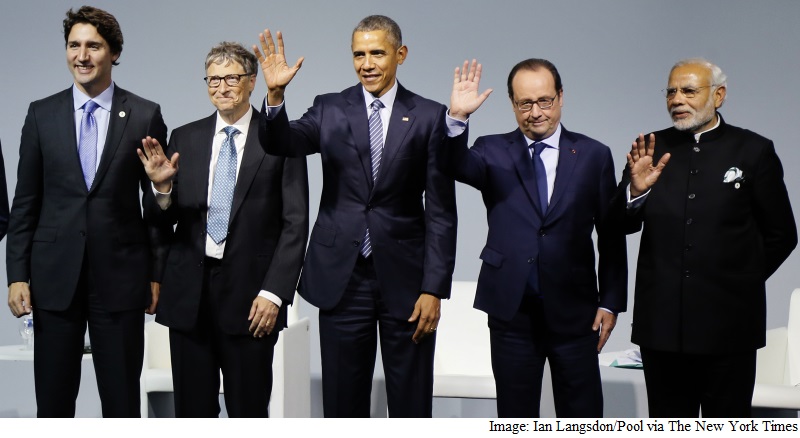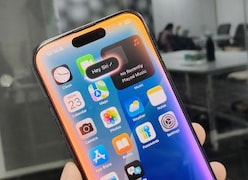- Home
- Others
- Others Features
- Bill Gates Takes on Climate Change With a Powerful Rolodex
Bill Gates Takes on Climate Change With a Powerful Rolodex

Gates told Hollande that energy innovation needed to be a top agenda item at the climate change conference now taking place in this airport suburb outside Paris. For years, Gates had prodded governments to increase spending on research and development of clean technologies. He had sunk $1 billion (roughly Rs. 6,687 crores) of his own fortune into startups working on new kinds of batteries and nuclear reactors.
"Honestly, I've been a bit surprised that the climate talks historically haven't had R&D on the agenda in any way, shape or form," Gates, 60, said in an interview last week on the sidelines of the summit meeting, which concludes Friday.
The June tete-a-tete helped accelerate a sequence of events that led to one of the biggest public-private partnerships to tackle climate change, unveiled at the conference last week. Gates, who made billions from Microsoft before remaking himself as a philanthropist, was a linchpin of the effort, acting as an envoy between the worlds of business and policy.
His role in sealing the deal offers a peek into how the inner circles of governments and industry intersect. It also underscores how a handful of the world's wealthiest people can stand with heads of state to spotlight a social, economic and policy issue on the global stage. For Gates, the world's richest person and co-chairman of the biggest private foundation, it is another sign of how his vast foreign aid operation and status as a technology icon have turned him into a uniquely influential global diplomat.
Gates was drawn into the effort after the June meeting with Hollande and separate discussions with White House staff members in the summer. Hollande and President Barack Obama saw the tech mogul as a potential catalyst for achieving broad political and diplomatic goals at the climate conference. In particular, Gates' renown in India as a tech founder and philanthropist gave the French and US governments a key emissary to get the Indian prime minister, Narendra Modi, on board with their climate goals.
Hollande and Obama agreed to work with Gates to assemble a coalition of governments to double their spending on energy research and development. For added heft, Gates volunteered to organize a group of billionaires to fund clean-technology startups. He reached out to his extensive network, including Jeff Bezos of Amazon, Jack Ma of Alibaba and Mark Zuckerberg of Facebook, all of whom agreed to participate.
Last week, on the opening day of the Paris meeting, Gates joined Obama and Hollande to introduce the coalition. It will commit 20 governments to doubling their renewable energy research budgets to a total of $20 billion (roughly Rs. 1,33,740 crores) over the next five years.
In addition, Gates and a group of other wealthy businesspeople agreed to invest at least $2 billion in clean-energy startups - with half the money coming from Gates himself. The group plans to finance companies that turn promising clean-energy concepts, some of which will originate in government labs, into viable products. Some of the companies will fail, Gates warned.
"Bill Gates is the intellectual architect of this," said Brian Deese, a senior adviser to Obama on energy and climate change policy, referring to the group of private investors.
The partnership has already drawn criticism. With the new clean-energy fund, detractors say Gates and other members of the coalition are overly focused on energy moonshots that will take decades to pay off - if they ever do.
"I'm perfectly willing to stipulate that countries underinvest in R&D, but it doesn't change the fact of the time frames involved," said Joe Romm, a former US Energy Department official and a senior fellow at the Center for American Progress, a liberal think tank.
The new coalition also will not come close to supplying what is needed to make the global energy transition necessary to stop climate change. The World Bank has estimated the cost of such an effort at up to $100 billion annually.
Gates said the coalition was focused on early-stage investments but any breakthrough startups could raise more capital to finance deployment of their technologies. "The more than $2 billion we have committed right now is just a start," he said. "As deals come in and the government pipeline increases, that number will grow."
This account of how the public-private partnership came together is based on more than a dozen interviews with people involved in the effort, who spoke on the condition that they not be named because many of the conversations were private.
The seeds for a partnership were planted in January when Obama visited Modi in New Delhi. Obama's goal was to forge a close relationship with Modi, in hopes of finding common ground on climate change. During those conversations, Modi pointed out his challenge: He needed new electricity to help raise India out of poverty, but coal was the cheapest power source. He said India would use clean energy if there were tech breakthroughs that provided that energy inexpensively.
Modi's message prompted Obama to consider how to achieve more clean-energy innovation. One idea was a multigovernment coalition to increase spending on clean technology.
Gates, meanwhile, had also been thinking about how to promote more energy innovation. His years building Microsoft had given him a Rolodex full of billionaire friends and a net worth of about $80 billion (roughly Rs. 5,34,960 crores). He and his wife, Melinda, have since set up the Bill & Melinda Gates Foundation, which has brought him into contact with many governments.
The foundation, whose endowment is now more than $41 billion (roughly Rs. 2,74,167 crores), says it has spent $34.5 billion (roughly Rs. 2,30,701 crores) in the 15 years since it was formed, concentrating on initiatives to alleviate world poverty, enhance global health and improve education in the United States.
Climate change has also been a concern for Gates, who has said that energy innovation needs government and industry cooperation. While governments are suited to do the basic research that produced the technical foundations for the Internet and other industries, he has said, companies need to bring those basic research breakthroughs into the marketplace.
In June, Gates met with Hollande to lay out his ideas. Over the summer, Gates also discussed the issue with Obama's top aides.
Both Obama and Hollande saw Gates as potentially helpful in wooing Modi to sign a climate deal in Paris. Gates and Modi met in India last year, engaging in a dialogue about toilets. Modi had vowed to end open defecation in India, which contributes to disease; Gates' foundation has sponsored efforts to improve toilets.
In September, Hollande invited Gates and Modi to meet on the sidelines of the U.N. General Assembly in New York. Gates wanted Modi's support for increased clean-tech spending, said a person familiar with Gates' thinking.
At that meeting, the men discussed India, "saying, 'Come on, world, we need to do R&D'" for more clean energy, Gates said. The two agreed about a public-private partnership to fund clean-energy innovation, with Modi even coming up with a name: Mission Innovation.
At the same time, the Obama administration solidified its idea of creating a coalition of governments to increase public spending on clean energy.
Gates also proposed creating a group of private billionaire supporters. To link it with the government coalition, he stipulated the billionaires would not invest in clean technology in a country unless that country's government was part of the joint government fund.
Gates said he knew he needed patient investors, because energy technologies typically take decades to refine and deploy. So he reached out to contacts worldwide, including the Saudi prince Alwaleed bin Talal and the Indian industrialist Ratan Tata. In mid-September, he emailed Bezos, the Amazon chief, who agreed immediately to join.
Gates also emailed Neil Shen, an entrepreneur and venture capitalist in China. "He knows many parts of the global economy," Shen said of Gates. "I think that kind of leadership fits very well to rally these kinds of investors in a coalition."
Gates discussed the effort with Reid Hoffman, a co-founder and executive chairman of LinkedIn. At a meeting in Seattle this fall, Gates made it clear that he needed people to contribute meaningful amounts of capital, not just lend their names to the push, Hoffman said.
"Bill has committed to investing $1 billion of his own money," Hoffman wrote in an email, "so in joining the coalition you have to put in real dollars."
For Gates, the partnership is only a small step forward. "Given the scale of the challenge, we need to be exploring many different paths," he wrote last week. "I hope even more governments and investors will join us."
© 2015 New York Times News Service
Catch the latest from the Consumer Electronics Show on Gadgets 360, at our CES 2026 hub.
Related Stories
- Samsung Galaxy Unpacked 2025
- ChatGPT
- Redmi Note 14 Pro+
- iPhone 16
- Apple Vision Pro
- Oneplus 12
- OnePlus Nord CE 3 Lite 5G
- iPhone 13
- Xiaomi 14 Pro
- Oppo Find N3
- Tecno Spark Go (2023)
- Realme V30
- Best Phones Under 25000
- Samsung Galaxy S24 Series
- Cryptocurrency
- iQoo 12
- Samsung Galaxy S24 Ultra
- Giottus
- Samsung Galaxy Z Flip 5
- Apple 'Scary Fast'
- Housefull 5
- GoPro Hero 12 Black Review
- Invincible Season 2
- JioGlass
- HD Ready TV
- Laptop Under 50000
- Smartwatch Under 10000
- Latest Mobile Phones
- Compare Phones
- OnePlus Turbo 6V
- OnePlus Turbo 6
- Itel Zeno 20 Max
- OPPO Reno 15 Pro Mini 5G
- Poco M8 Pro 5G
- Motorola Signature
- Vivo Y50e 5G
- Vivo Y50s 5G
- Lenovo Yoga Slim 7x (2025)
- Lenovo Yoga Slim 7a
- Realme Pad 3
- OPPO Pad Air 5
- Xiaomi Watch 5
- Huawei Watch 10th Anniversary Edition
- Acerpure Nitro Z Series 100-inch QLED TV
- Samsung 43 Inch LED Ultra HD (4K) Smart TV (UA43UE81AFULXL)
- Asus ROG Ally
- Nintendo Switch Lite
- Haier 1.6 Ton 5 Star Inverter Split AC (HSU19G-MZAID5BN-INV)
- Haier 1.6 Ton 5 Star Inverter Split AC (HSU19G-MZAIM5BN-INV)

















